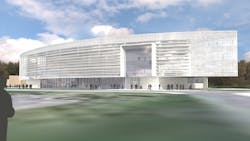Ford Announces Robotics Partnership with University of Michigan
Adding to the list of automakers with direct collaborations with university robotics departments in the development of autonomous vehicles, Ford announced plans on Wednesday to relocate a dozen of its researchers to the University of Michigan’s Ann Arbor campus to make use of its new robotics laboratory.
The robotics lab isn't projected to open until 2020, but the researchers will move to the university at the end of this year.
In addition, U-M professors Matthew Johnson-Roberson and Ram Vasudevan will serve as leaders of a new autonomous vehicle research team made up of graduate students, postdoctoral fellows and researchers, the company said in a statement.
Ford will lease the fourth floor of the new laboratory in the North Campus Research Complex. All told, the company will relocate more than 100 of its employees to the site, an approximately 140,000-square-foot building on Hayward Street, east of the university’s Space Research Building.
The planned robotics laboratory will have space where machines walk, fly, drive and swim, Ford said in a statement. The building will house labs, offices and classrooms.
In August, Ford announced that it planned to roll out fully autonomous cars for ride-sharing use in 2021.
Ford’s team will also be near Mcity, a controlled test environment for autonomous vehicles where Ford and other automakers have been testing vehicles since last fall.
Johnson-Roberson is an assistant professor of naval architecture and marine engineering, and has worked in autonomous vehicles since the first DARPA Grand Challenge in 2004. His research focuses on robotic systems perception.
Vasudevan is an assistant professor of mechanical engineering with a background in robotics and next-generation automotive technologies.
“We’re at the point where you are beginning to see the positive impact driverless cars could have on people’s lives,” Vasudevan said in the statement from Ford. “Sometimes, the challenge for us as professors and engineers is knowing what the relevant research problems are that need to be addressed to guarantee the success of autonomous vehicles. Working closely with Ford gives us the data and equipment to better understand and resolve the challenges that lie ahead.”
In addition, U-M’s College of Engineering named Professor Jessy Grizzle as director of robotics. Grizzle also serves as the key liaison between Ford’s autonomous vehicle research program and the College of Engineering. A U-M professor of engineering since 1987, Grizzle has spent nearly two decades as a Ford consultant working on programs such as environmentally friendly emissions, enhanced fuel economy and hybrid-electric vehicles.
U-M is one of only a handful of universities to offer master’s and doctoral degrees in robotics, with the Ph.D. program now in its third year. More than 35 faculty members work in the field.
About the Author
IW Staff
Find contact information for the IndustryWeek staff: Contact IndustryWeek
